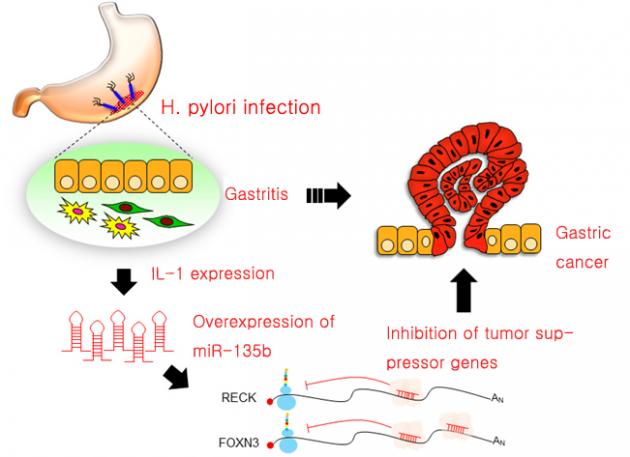Researchers at Korea Research Institute of Bioscience & Biotechnology (KRIBB) and Japan’s Kanazawa University have discovered new genes that expedite gastritis and gastric cancer and identified their functions.
KRIBB expects the new findings will contribute significantly to the development of early gastric cancer diagnostic markers and therapeutic agents using the genes.
The team, led by Professors Han Tae-soo of the Biopharmaceutical Research Center at KRIBB and Masanobu Oshima of the Cancer Research Institute at Kanazawa University, used a spontaneous gastritis and gastric cancer mouse model and samples from gastric cancer patients to uncover a new gene called microRNA-135b (miR-135b) and found that this gene facilitates gastritis and gastric cancer.
Professors Kim Sung-jin and Yang Han-kwang also participated in the research.
Gastritis, mainly caused by Helicobacter pylori infection, genetic factors, and dietary habits, can develop into gastric cancer if the symptoms get chronic. Although early detection of gastric cancer is the critical factor to increase the survival rate, it required identification of diagnostic markers and mechanism of action.

The team found that miR-135b expression significantly increased in gastritis and early-stage gastric cancer compared with normal stomach tissue, and confirmed the cause of the increase was Interleukin-1 (IL-1).
The study also proved that miR-135b inhibited expression of tumor suppressor genes such as forkhead box N3 (FOXN3) and reversion-inducing-cysteine-rich protein with kazal motifs (RECK) and caused the cancer cells to grow.
“Using miR-135b, which is a novel gastric cancer gene discovered through this study, we expect that it will help the development of efficient diagnostic markers that can increase early gastric cancer detection,” a researcher said.
The team also believes that the use of inhibitors of miR-135b will contribute to the development of gastritis and gastric cancer treatment, he added.
Gastroenterology published the results of the study.

